Table of Contents
Thinking about buying a Ford Everest? One of the biggest decisions you'll make is choosing the right engine. The ford everest diesel engine options are impressive, offering a range of ability, torque, and fuel efficiency to suit different lifestyles. At westernfordhcm, we understand this choice can be overwhelming. This article will break down the specifics of each Ford Everest diesel engine, exploring its ability and performance characteristics, fuel economy, and environmental considerations. We'll help you understand the differences and guide you toward selecting the perfect engine for your driving needs and preferences. Get ready to explore the heart of the Everest – its powerful diesel engine.

Ultimate Ford Everest Diesel Engine Guide
Ford Everest Diesel Engine Strength and Performance

Ford Everest Diesel Engine Strength And Performance
The Powerhouse: Revealing the Everest's Might
Hey there, fellow car enthusiasts! Let's talk about the Ford Everest's diesel engines – seriously impressive pieces of engineering. I mean, imagine this: you're towing a massive caravan across rugged terrain, and this thing just keeps chugging along. It's like a workhorse disguised as a stylish SUV. The torque – that's the twisting strength – is phenomenal. It's the difference between smoothly pulling away from a standstill and struggling to get moving. Think of it as the difference between effortlessly climbing a hill on your bike and having to push really hard. The strength is smooth and reliable, and that’s what makes the Everest a true champion. Want to learn more about the Everest? Check out our guide on what a Ford Everest is.
- Unbelievable towing capacity
- Smooth and reliable strength delivery
- Impressive torque for tough jobs
Engine Options: Choosing Your Beast
Now, the Ford Everest doesn't just have *one* diesel engine; they offer a few different choices, each with its own strengths. It's like picking your perfect superhero – each one has unique superpowers. There's the 2.0-liter bi-turbo – smaller but mighty, perfect for those who value fuel efficiency without sacrificing strength. Then there's the larger 3.0-liter V6 – the ultimate muscle car of the Everest lineup. It's all about finding the right fit for your needs. Need to know if the Everest is right for you? See if it's reliable enough for you!
Engine Size | Capability (kW) | Torque (Nm) |
|---|---|---|
2.0L Bi-Turbo | 154 | 500 |
3.0L V6 Turbo-Diesel | 184 | 600 |
Performance in Real-World Scenarios
I've seen this thing in action – hauling boats, pulling caravans, and conquering some seriously challenging off-road tracks. The Ford Everest diesel engine doesn't just promise strength; it delivers. It's the kind of engine that makes you feel confident, no matter the terrain. It’s not just about numbers on a spec sheet; it's about the feeling of effortless ability, the smooth acceleration, and the unwavering reliability. It's about knowing you can rely on your vehicle, even when things get tough. Wondering about its capabilities? Read up on whether the Everest has a remote start function.
Ford Everest Diesel Engine: Fuel Efficiency and Environmental Impact

Ford Everest Diesel Engine Fuel Efficiency And Environmental Impact
Fuel Efficiency: Getting More Miles Per Gallon
Let's be honest, nobody *loves* filling up their gas tank. It's expensive, and it's a bit of a hassle. That's why fuel efficiency is a big deal. The Ford Everest diesel engines, especially the 2.0-liter bi-turbo, are designed to give you a better fuel economy compared to some gas-guzzling SUVs. Think of it like this: you're getting more miles for every drop of fuel. That means fewer trips to the gas station and more money in your pocket. To see what else the Everest can do, check out our article on .
Engine | Estimated Fuel Economy (km/L) |
|---|---|
2.0L Bi-Turbo | 12-15 (This is an estimate, actual mileage varies) |
3.0L V6 Turbo-Diesel | 10-12 (This is an estimate, actual mileage varies) |
Environmental Impact: Thinking Green
We all need to think about the environment, right? Diesel engines aren't perfect, but they've come a long way. Modern diesel technology is designed to reduce harmful emissions. The Ford Everest's diesel engines use advanced emission control systems to keep things cleaner. It's like giving the planet a bit of a break. The smaller 2.0-liter engine tends to have a slightly smaller carbon footprint than the larger V6, but both are more efficient than many older SUVs. Want to know more about the Everest's origins? Find out where Ford Everests are made.
- Reduced emissions compared to older vehicles
- Advanced emission control systems
- More efficient than many petrol SUVs
Choosing the Right Engine for You and the Planet
So, how do you choose? It's a balancing act. If fuel efficiency is top priority, the 2.0-liter bi-turbo might be the better choice. However, if you need the extra ability of the 3.0-liter V6, you might accept a slightly lower fuel economy. Ultimately, it’s about finding the sweet spot that works for your needs and your environmental conscience. And hey, maybe you could even carpool sometimes – that's a great way to reduce your impact, too! Ever wondered about the Everest's capabilities? See if it meets your expectations by reading our guide on .
Choosing the Right Ford Everest Diesel Engine for Your Needs
Okay, so you're ready to pick your Everest engine – awesome! It's like choosing your superpower, because each engine has its own unique abilities. The 2.0-liter bi-turbo is the sneaky, fuel-efficient ninja. It's perfect for zipping around town, and it's surprisingly strong for its size. Think of it as a lightweight boxer – quick, agile, and packs a punch. It's great if you mostly drive on paved roads and don't need to tow a huge boat or caravan. Want to make sure the Everest is a good fit for your lifestyle? Check out our guide on .
- Great for city driving
- Excellent fuel economy
- Surprisingly strong for its size
Then there's the 3.0-liter V6 – the heavyweight champion. This engine is a beast! It's got incredible towing strength, and it’s perfect for those who need to haul heavy loads or regularly tackle tough off-road adventures. Imagine it as a heavyweight wrestler – strong, powerful, and ready for a challenge. If you frequently tow a caravan, a boat, or need to go off-roading, this is your engine. Need to know if the Everest is reliable enough for you? Check our article on !
Engine | Best For | Think of it as... |
|---|---|---|
2.0L Bi-Turbo | City driving, fuel efficiency | A lightweight boxer |
3.0L V6 | Towing, off-roading | A heavyweight wrestler |
Think about how you'll mostly use your Everest. Do you mostly drive in the city, or do you need a truck that can handle anything you throw at it? Maybe you need something in between? The right engine choice will depend on your lifestyle. It’s like picking the right tool for the job – you wouldn’t use a hammer to screw in a screw, right? Considering the remote start feature? Find out if the Everest has it in .
Choosing the right engine is a personal decision. There's no single "right" answer. It depends entirely on what you want from your Everest. Do you prioritize fuel efficiency? Or is towing capability more important? Once you know what matters to you most, choosing the right engine becomes a lot easier. Need to know where your Everest is made? Check out our article on .
Final Thought
Ultimately, the best Ford Everest diesel engine for you depends on your individual priorities. If you need maximum capability and towing capacity, the larger V6 might be the way to go. If fuel efficiency is your main concern, the 2.0-liter bi-turbo is a strong contender. Carefully consider your driving habits, typical loads, and budget before making your decision. Remember to test drive the different models to experience the performance firsthand. Happy driving!